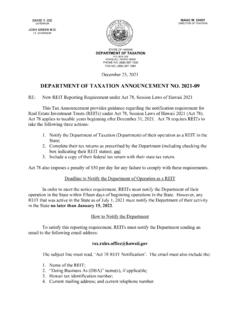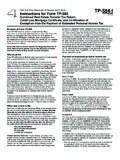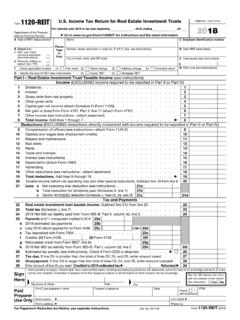Transcription of Basic Investment Terms - CCMI Creative Capital …
1 8880 Rio San Diego Drive, Suite 1150 | San Diego, California 92108-1690 (619) 298-3993 | (800) 615-6666 | Fax (619) 298-1976 Robert C. Eddy, CFP Margaret F. Eddy, CFP Matthew B. Showley, CFP Because money doesn t come with Basic Investment Terms ANNUITY A financial product sold by financial institutions pay out a stream of payments to the individual at a later point; primarily used as a means of providing guaranteed cash flow for an individual during their retirement years. ASSETS Resources with economic value owned by a company, fund, or individual, especially those that can be converted to cash; real estate , automobiles, investments (stocks and bonds), materials, inventories, etc. ASSET CLASS An Investment category; equities (stocks), fixed income (bonds), or money market (cash).
2 Asset classes can be divided into size (small, mid and large capitalization stocks), geographic location (international, emerging markets, etc.), and other ( real estate , commodities, hedge funds, etc.). BEAR OR BULL MARKET A bear market is a prolonged market period where Investment prices fall, usually accompanied by widespread pessimism, as a result of economic recession, high unemployment, or rising inflation (the Depression and Tech Bust of 2000 are examples). A bull market is a prolonged period where Investment prices rise faster than their historical average, as a result of economic recovery, boom, or investor psychology; these Terms are most often used to refer to the stock market, but can be applied to anything that is traded, such as bonds, currencies, and commodities, Tech Boom of the late 1990 s.
3 BOND A debt security issued for a period longer than one year by corporations, governments, or their agencies, with the intent of raising Capital by borrowing; a bond is the promise to repay the principal along with interest on a specified date; some bonds do not pay interest, but all bonds require a repayment of principal. Capital GAIN The amount that an asset s selling price exceeds its initial purchase price; a realized Capital gain is an Investment that has been sold at a profit, while an unrealized Capital gain is an Investment that has not been sold yet, but would result in a profit if it was to be sold. Capital LOSS A decrease in the value of an Investment or asset from the initial purchase price; opposite of Capital Gain.
4 A realized Capital loss is an Investment that has been sold at a loss, while an unrealized Capital loss is an Investment that has not been sold yet, but would result in a loss if it was to be sold. COMMODITY A tradable, physical substance that can generally be further processed and sold, and is interchangeable with other products of the same type for investors to buy and sell; the prices of commodities are subject to supply and demand; oil, metals, wheat, coal, etc. COMPOUND INTEREST Interest which is calculated on both the principal and interest previously earned in prior periods. DIVERSIFICATION Spreading money among several Investment options or asset classes for the purpose of reducing company and industry risk in a portfolio; combining a variety of investments (stocks, bonds, real estate ), which are unlikely to all move in the same direction at the same time or at the same rate; reduces both upside and downside potential and allows for more consistent performance under a wide range of economic conditions.
5 DIVIDEND A taxable payment paid to a company s shareholders out of the current or retained earnings, usually quarterly; usually distributed as cash, but can also take the form of stock or other property; provide an incentive to own stock in stable companies; usually paid by companies that have progressed beyond their growth phase and no longer sufficiently benefit by reinvesting their profits. DOW JONES INDEX The most widely used indicator of the overall condition of the stock market; a price-weighted average of 30 actively traded blue chip stocks. EQUITIES Types of securities that represent ownership in a corporation and represent a claim on a proportionate share of the corporation s assets and profits, stocks.
6 FIXED INCOME A security that pays a specific interest rate, bonds, preferred stock. INDEX A numerical measure of price movement in financial markets; a barometer for a given market or industry and benchmarks against which financial or economic performance is measured, the S&P 500 index. INDIVIDUAL RETIREMENT ACCOUNT/ARRANGEMENT (IRA) A personal savings account established at a bank, mutual fund, or brokerage that allows wage-earning individuals to make tax-deferred contributions to a personal retirement fund and invest the savings; withdrawals begin at age 59 1/2 or later (or earlier, with a 10% penalty), with the exact amount depending on the year and the age of the individual; some contributions qualify as a deduction against income earned earlier in the year.
7 INFLATION An overall general increase in the price of goods and services resulting in a decrease in your ability to buy as much for the same amount of money and a fall in the value of the dollar; measured by the Consumer Price Index and maintained by the Fed at usually 2-3% annually, but can vary depending on circumstances. Investment A financial product or other asset or item of value acquired for the purpose and expectation of increasing its value through growth (increase in price) or income (dividends or interest) with favorable future returns. LIQUIDITY The ability of an Investment to be easily converted into cash with little-to no loss of Capital , no price discount, and a minimum of delay. MARKET A public place where buyers and sellers conduct transactions, either directly or via intermediaries.
8 MUTUAL FUND An open-ended fund operated by an Investment company that raises money from shareholders and invests it in stocks, bonds, options, commodities or money market securities in accordance with a stated set of objectives; shareholders are free to sell their shares at any time, although the price will fluctuate daily depending on the performance and securities held by the fund. NATIONAL ASSOCIATION OF SECURITIES DEALERS AUTOMATED QUOTATIONS (NASDAQ) A computerized New York-based stock exchange, usually primarily representing a market for technology companies; all trading is done over computer networks and via telephone, as there is no trading floor uniting buyers and sellers. OPTION An agreement that conveys the right, but not the obligation, to the holder to buy or sell a particular security at a stipulated price within a stated period of time; if the option is used, the seller is responsible for delivering the shares to the appropriate party; if the option is not exercised, the option will expire and the money spent to purchase the option is lost.
9 PORTFOLIO An investor s collection of Investment holdings, usually with reference to its composition; these often include stocks, bonds, and mutual funds. PROSPECTUS A legal document, required by the Securities Act of 1933, setting forth the complete history and current status of a security or fund, Terms , issuer, objectives, financial statements, and planned use of money to help an investor decide whether the Investment is appropriate for him/her; it must be made available whenever an offer to sell is made to the public. real estate Investment trust (REIT) A trust that uses pooled money to invest in property and/or mortgage loans; REIT s are granted special tax considerations and are traded on major exchanges; there are several benefits over actually owning properties, and they pay dividends no matter how the shares perform and are valued based on measures similar to stocks.
10 RETURN The amount of money earned or lost from an Investment in a particular period, usually expressed as a percentage of the total amount invested. RISK The measurable likelihood of loss or less-than-expected returns. SECURITIES AND EXCHANGE COMMISSION (SEC) The regulatory authority and independent agency for the securities industry, promoting full disclosure and protecting investors against fraud and manipulative practices in investing. SECURITY The paper right to a tradable asset that offers evidence of debt or equity issued by a corporation, government or organization. SIMPLE INTEREST Interest calculated on a principal sum, not compounded on earned interest. STANDARD & POOR'S 500 Index (S&P 500) A well known index computed by Standard & Poor's Corporation, determined by the price action of 500 widely held large corporations from different sectors of the economy; it is frequently considered representative of the stock market as a whole.



